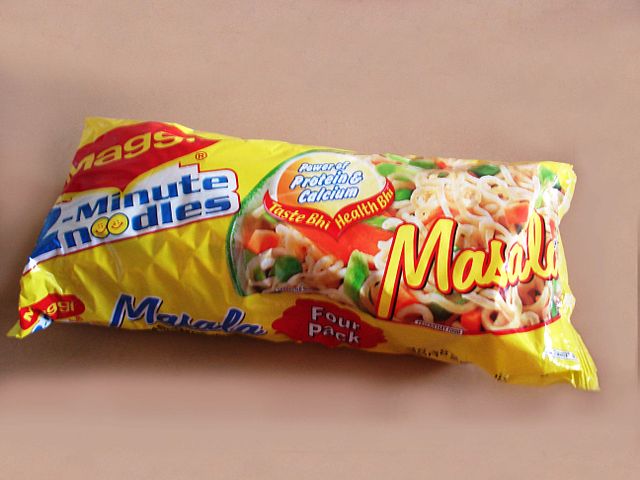"Our criteria for deciding what is good and what is bad is very fickle, specially in this country," said American musician Roberta Flack but that seems to be fairly true of all countries, as is visible from the latest furore over the Maggi issue. We all love to pass judgements, but do we even understand what is going on?
Let's look at the Indian Express report on the issue. It says "Two dozen packets were tested" and "all the packets of instant noodles tested in the state-run laboratory were contaminated”. "A company spokesman confirmed Uttar Pradesh had ordered it to withdraw the batch dating back to March 2014".

Maggi noodles. Pic: Wikimedia commons
The question to ask is, were all these two dozen packets from the same batch? If yes, why did the government/Food Safety Officers collect samples from the same batch? If not, what was the report on other batches of products that were tested? If there were other batches that were contaminated, why wasn't a recall order issued for those? And, if the other batches were not contaminated then why was that not published?
The comment of the Deputy General Inspector of the FDA Uttar Pradesh, D G Srivastava -- "Our experts conducted several tests and each time the results were shocking" -- clearly seems to be aimed at sensationalising the issue more than anything else.
Another point in question, why is nobody talking about availability of packets which were way beyond their "Best Before" date; in fact, why is the government going about testing packets which are beyond the expiry date? Bear with me for exaggerating this a little bit, but it is much like you picking a rotten potato, sending it to the lab and then coming back with a loud claim to the world that it is rotten.
Next, let's look at the response from Nestle. They claim that they have tested 600 product batches and their results (covering 125,000,000 pkts) all show values within range. They have also put up a copy of the test reports here. Of course, we don't trust the companies to do the right thing, which would mean that they are selectively publishing only their success reports, or that the reports are doctored.

On the other hand, if the company reports are doctored, then why is the government not taking any action against the lab which is colluding with the manufacturer? The lab is a NABL accredited lab and if the accreditation does not guarantee independence or authenticity, why are we not questioning the accreditation procedure and why it failed?
One should not overlook the fact that there are several factors that bear upon the process of testing itself. A major issue is that of traceability of supply chain. For example, it is hard to trace where a particular batch of wheat came from, which batch of wheat was used to produce which batch of maida, and hence which batch of noodle. Due to this, it is hard to predict the quality of a batch merely by testing a random sample from the batch. Doing multiple samples may not fix the issue either and raises the cost exorbitantly.
Another issue is that manufacturing is outsourced for most big companies, and many a time the outsourcing partners are not as serious about quality standards as the parent company itself. They tend to do a lot of dressing up of records to cut costs.

A copy of the test report. Pic: Nestle
It’s not just Maggi!
Finally, let’s try to understand the issue of heavy metal contamination, which is in the eye of the storm. It is not as if Nestle (or any other company) adds these heavy metals to the product. These come from the raw material. The two main ingredients in Maggi are maida (which comes from wheat) and water.
If the maida/wheat is contaminated, it means our soil is contaminated. Which means Maggi, or any other food that we are manufacturing from the crop grown in this soil contains heavy metals. So all your food, whether you are getting in packets or not, is contaminated. For the scientifically inclined, checkout the research on Heavy metal contamination of soil and vegetables in suburban areas of Varanasi, India.
If it is water which is the source of contamination, then we are directly impacted. So what is the government doing about addressing this issue? Making a hue and cry about Maggi does nothing to fix the real issue of contamination in our food.
As a footnote, we are not saying that Nestle should not be taken to task. We have a fairly progressive law in Food Safety Standards Act, Rules and Regulation which for the first time talks about a systematic approach to managing food safety. If the standards were not followed by Nestle, they need to explain why.
More importantly, if the standards were followed and we still got the results that we did, we need to plug the hole in the rules and the regulation. This will ensure that the rule is applied for all manufacturers. That is what will take us to safer food for everyone in the long run, not sensationalisation of the issue.























